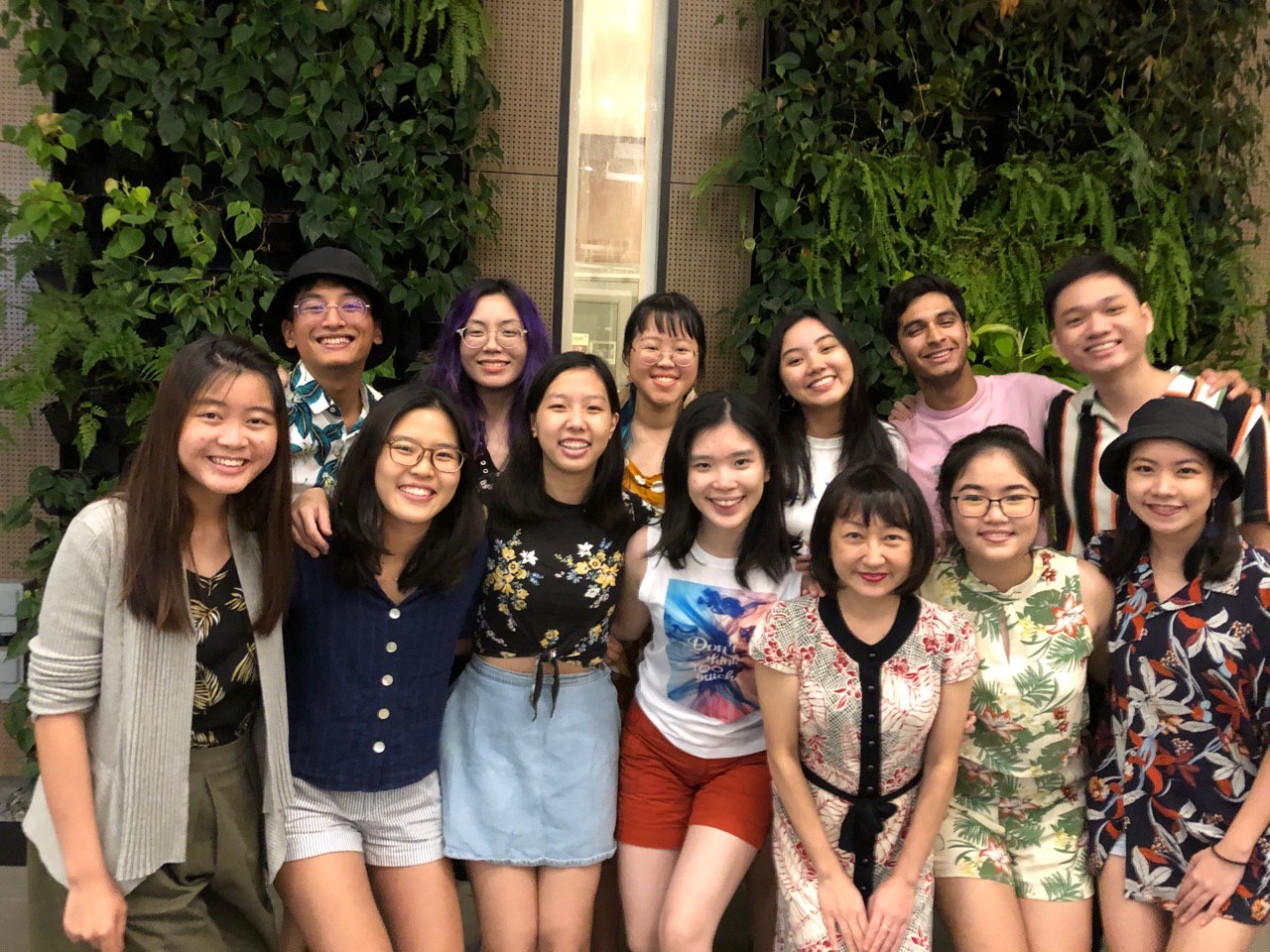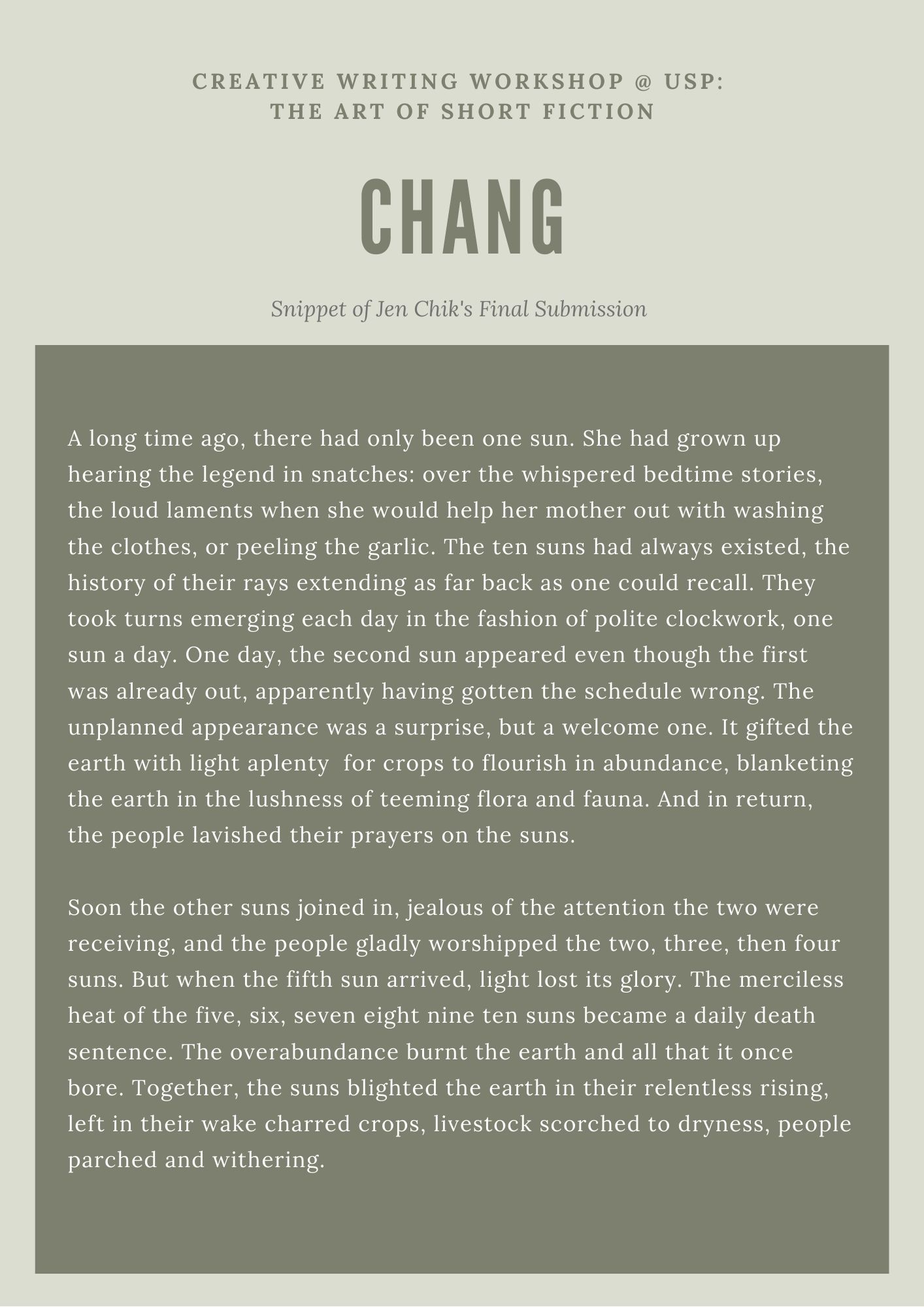The Very Human Way of Making Life More Bearable: Creative Writing Instructor Dr Yeo Wei Wei
By Jen Chik Hui Xin (English Literature + USP, Class of 2022)
Jen is a student writer for USP Highlights.
Published: 18 September 2020
I took Dr Yeo Wei Wei’s non-credit-bearing creative writing class, A Very Human Way of Making Life More Bearable: The Art of Fiction, when it was first offered in August 2019. I thought I had signed up for a creative writing class, but what I got in return was much more than that. Dr Yeo’s classes felt more like a mentorship—her classes were thorough yet accessible, and Dr Yeo was personally invested in seeing us through to achieving the final deliverable of our class, a short story of about 2000 words.
A month after our classes ended, I had the opportunity to visit Dr Yeo at her house. She had graciously invited me over for the interview and sat me down with a delightful cup of tea and some biscuits to go with it. We began by discussing the creative writing class, and Dr Yeo explained how the title of the class originated from a Kurt Vonnegut quote which encapsulated the motivation of the class:
The arts are not a way to make a living. They are a very human way of making life more bearable. Practicing an art, no matter how well or badly, is a way to make your soul grow, for heaven's sake.
— Kurt Vonnegut
Despite being a creative writing course, the class was distinctively USP in its diversity. Not only did the class have students from vastly contrasting majors, we also had very different writing backgrounds and experience. For me, I was curious as to how Dr Yeo set out to teach this course given the varying experience levels of the students. Dr Yeo, however, countered my assumption with a perceptive response that her class was targeted at students who were clearly very interested in writing fiction. It was not their skill or abilities that made the class what it was, but the inquisitiveness to know more about writing that made the class fun to teach.
In fact, her class was not meant to be taught in an overtly technical way, and therefore would be accessible to all students. With a small smile, she reflected that even though fiction is a craft, it is an art more than it is a craft. She divulges that a lot of fiction is actually unteachable. Much of it is a process of discovery, and the challenge for the instructor is then to guide the students with points of entry for them to discover the craft themselves.
She explains, “I didn’t want students to come away thinking that I was giving them a toolbox with a fixed set of tools with which they had to use to make their own houses. It’s really not like that.”
I probe further: if not to equip students with a toolbox, what did she believe the point of a creative writing course was? She discerns that when we talk about teaching the fundamentals of writing, there are always basic story elements that feature in every piece of writing, such as character and plot. However, her writing course aims to go beyond that by allowing students to learn not only the fundamentals but to experience them. She believes that students have to experience the difficulties of creating plots and characters as similar, or analogous, to their own experiences in human life. The craft of fiction is thus not technical but experiential, and perhaps, even existential.

Dr Yeo’s eloquent writing, which she kindly workshopped with us in class, contains no hint of the circuitous route she took to become a writer. Growing up, she spoke mostly Mandarin and Hokkien as both her parents were Chinese educated. The only place she encountered English was in school, and even though she did well in English academically, she felt that she just could not find her voice when she wrote creatively. She muses that every time she wrote in English, it felt like she was wearing borrowed clothes. She just could not feel at home with the English language.
It turns out that it was only when Dr Yeo was pursuing her PhD that she began to feel comfortable in English. “Maybe it is because the training of the PhD requires you to just read and write all the time. The discipline that was developed during those years somehow brought the English language into my bloodstream. It is very bizarre,” she laughs, “because you would think that if my English was perfectly fine all this while, why would I feel that English wasn’t in my bloodstream? But it just never was.”
It was only in her early 30s that Dr Yeo wrote her first story. She had been teaching in the capacity of an assistant in the NUS English Literature department prior to this, but she left once she wrote her first story. She realised that it was impossible for her to produce work as a literary critic and a fiction writer at the same time and decided that fiction was what she wished to pursue. From then on, Dr Yeo dedicated her time to writing.
To end off, I asked Dr Yeo to share some nuggets of wisdom on writing, for aspiring writers. “In order to grow as a writer, you have to firstly be a reader. If you start off by being very interested in writing, but you don’t know very much about reading, you have to be open to learning about reading. Join in the conversations that already exist within literary history and literary tradition. As a writer, no matter how much of a novice you are, the moment you start writing you are already engaging with existing stories and existing ideas.”
Dr Yeo Wei Wei has returned to USP this semester to offer another Creative Writing Workshop (via Zoom) for USP students. Classes are currently ongoing and we hope students taking the workshop this time round will enjoy it as much as Jen did. Read below for a snippet of Jen's final submission for the workshop.


